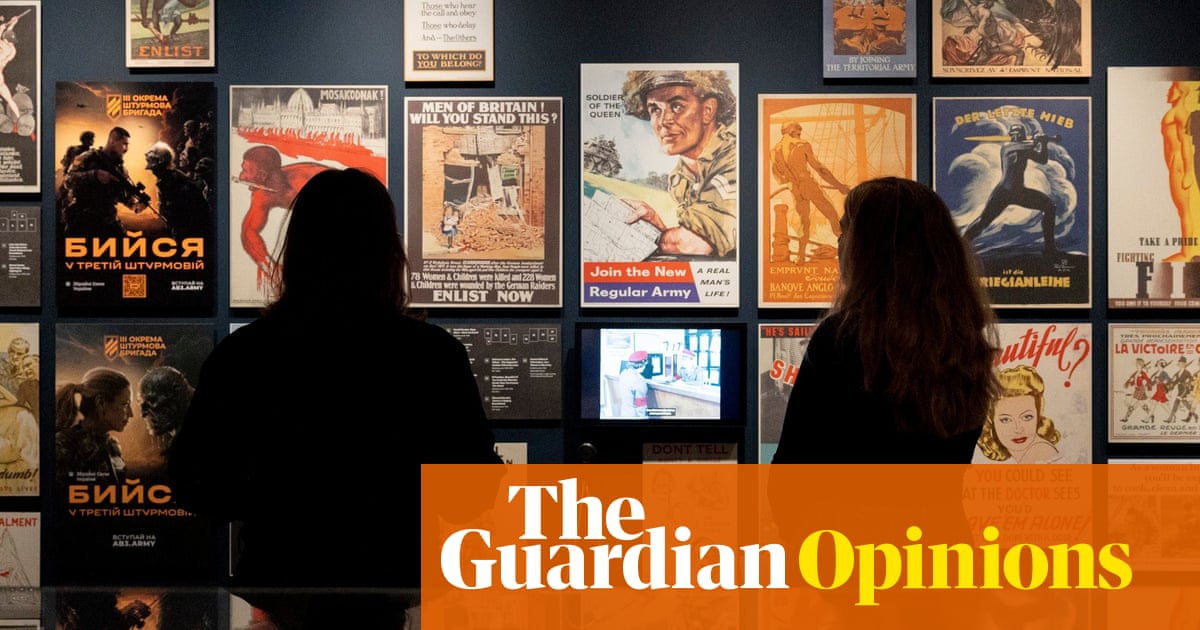Iwouldn’t ordinarily rush to the Imperial War Museum in London, because the place is one tricky proposition. I spent hours there when I was young, researching black servicemen in the first and second world wars, as part of a bigger project about multicultural London. (Newsflash– it’s been multicultural since for ever.)
The archives are incredible, and the staff could not have been more helpful, yet every day, ambling past the giant death machines at the doors of the museum, past the flying injury-bringers that hang from the ceilings, I couldn’t help but think: pick a lane, guys. Either war is a bad thing, featuring real humans who lose their comrades, get hurt and killed, or if not, are changed for ever, in the service of an idea that later turns out to be some imperialist bullshit. Or, war is a good thing, because look at all this mighty equipment. It can’t be both.
Maybe the ambivalence wasn’t the museum’s, maybe it was my own, because I continued to go there until I took the kids when they were about seven and nine, and found myself having to explain the significance of Colin Self’s Beach Girl (1966), in which the artist used a mannequin, blackened and mutilated, to convey the likely physiological impact of a nuclear attack. They both started crying, which maybe I should have predicted.
Anyway, they are older now, but not old enough for its current exhibition,Unsilenced: Sexual Violence in Conflict, because none of us are. You may have the broad outlines of disparate atrocities in your head – the sex slaves taken by the Japanese imperial army between 1932 and 1945 as “comfort girls”, the rape of German women during the Soviet liberation, and the kidnapping and rape of Yazidi women in northern Iraq just over a decade ago. You may even know (though I didn’t) about the rape of Ukrainian men by soldiers of the Russian federation in this current war. In your lifetime, you will have lost count of how often you have passed war memorials, to unknown soldiers, to RAF bombers, to animals, but you probably won’t have seen sexual violence set in stone, which absence gestures towards one recurring theme in the code of silence: no society wants to look directly at this crime, because its details are hideous. I don’t ever want to think again about the use of the bayonet in Boer war sex crimes.
“Code of silence” sounds simple, but would run to a thousand sub-clauses: there is social squeamishness, survivors’ shame, an understandable sensitivity about the children who are born of rape. It’s well known that if you make your testimony and aren’t believed, the brutality is revivified; the jeopardy of saying this aloud to a postwar society that didn’t want to hear it would have been immense. At the end of the account of one victim – a Welsh woman married to a Belgian man, she had been raped by German soldiers while heavily pregnant, and lost her baby shortly afterwards – there’s a note from the recording official: “A decent little woman and quite reliable. No exaggeration attempted.” There’s something so revolting about the thought that your own decency would have to be adjudicated before you could be heard, that exaggeration would be assumed unless some random guy deemed it absent, and that you probably only made the cut because you happened to be Welsh, not Belgian.
Threading through the exhibition are academic voices, describing the complex interplay between militarism, humiliation, barbarism and the patriarchy, but just to be really ham-fisted and painfully straightforward about all this: war is the pre-condition, the portal from civilisation into cruelty.
This morning started with a thrum of news, from theUkraine-Russia peace talksto thedefence spending review, and it feels as though none of these conversations should be allowed to happen without first taking a minute to observe that war turns some soldiers, enough soldiers, into something less than human, and the results of that stain history for ever. It feels like the casual dehumanisation of military aggression gets lost in the margins of territory, strategy and percentages.
Zoe Williams is a Guardian columnist
Do you have an opinion on the issues raised in this article? If you would like to submit a response of up to 300 words by email to be considered for publication in ourletterssection, pleaseclick here.
